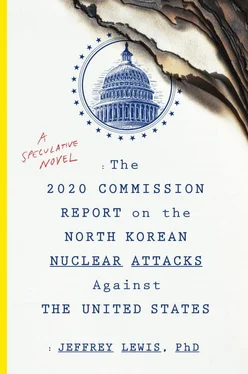Jeffrey Lewis - The 2020 Commission Report on the North Korean Nuclear Attacks Against the United States
Здесь есть возможность читать онлайн «Jeffrey Lewis - The 2020 Commission Report on the North Korean Nuclear Attacks Against the United States» весь текст электронной книги совершенно бесплатно (целиком полную версию без сокращений). В некоторых случаях можно слушать аудио, скачать через торрент в формате fb2 и присутствует краткое содержание. Город: New York, Год выпуска: 2018, ISBN: 2018, Издательство: Mariner Books, Жанр: Фантастика и фэнтези, Триллер, на английском языке. Описание произведения, (предисловие) а так же отзывы посетителей доступны на портале библиотеки ЛибКат.
- Название:The 2020 Commission Report on the North Korean Nuclear Attacks Against the United States
- Автор:
- Издательство:Mariner Books
- Жанр:
- Год:2018
- Город:New York
- ISBN:9-781-328-57391-9
- Рейтинг книги:4 / 5. Голосов: 1
-
Избранное:Добавить в избранное
- Отзывы:
-
Ваша оценка:
- 80
- 1
- 2
- 3
- 4
- 5
The 2020 Commission Report on the North Korean Nuclear Attacks Against the United States: краткое содержание, описание и аннотация
Предлагаем к чтению аннотацию, описание, краткое содержание или предисловие (зависит от того, что написал сам автор книги «The 2020 Commission Report on the North Korean Nuclear Attacks Against the United States»). Если вы не нашли необходимую информацию о книге — напишите в комментариях, мы постараемся отыскать её.
The 2020 Commission Report on the North Korean Nuclear Attacks Against the United States — читать онлайн бесплатно полную книгу (весь текст) целиком
Ниже представлен текст книги, разбитый по страницам. Система сохранения места последней прочитанной страницы, позволяет с удобством читать онлайн бесплатно книгу «The 2020 Commission Report on the North Korean Nuclear Attacks Against the United States», без необходимости каждый раз заново искать на чём Вы остановились. Поставьте закладку, и сможете в любой момент перейти на страницу, на которой закончили чтение.
Интервал:
Закладка:
In the end, however, it had come to nothing. For Moon and his advisers, persuading Kim Jong Un to abandon his nuclear weapons would take time. Reduce tension, get a peace agreement, and Kim would eliminate his nuclear arms just as a man would take off his coat in the hot sun. But President Trump wanted Kim to give up his nuclear weapons right away—permanent, irreversible, and verifiable disarmament, without delay and, in any event, no later than the end of the president’s first term. Kim had suspended nuclear and missile tests in the hope that summits with Moon and Trump marked the beginning of a new relationship between North Korea and the rest of the world. Those around Trump, though, continued to insist upon what Bolton called a “Libya-style” disarmament agreement. The notion that Kim would surrender his weapons as Muammar Gaddafi had, only to suffer a grisly death at the hands of opposition forces supported by American airpower, was a nonstarter. More than a few White House staffers believed that was precisely why Bolton, who was generally thought to oppose the negotiations, kept bringing it up. Kim ordered his scientists and engineers to resume missile and nuclear tests in order to make the point as clear as possible: North Korea was, and would remain, a nuclear power.
The implosion of negotiations between the United States and North Korea put unbearable pressure on Moon Jae-in. Moonshine simply could not work without a simultaneous improvement in relations between Pyongyang and Washington. The issues were simply too closely intertwined. “Neither South-North relations nor US-North relations will go far if the other fails,” explained South Korean diplomat Suh Hoon following the short-lived thaw. “They are like two wheels on a wagon that must roll together.” Without a deal between Trump and Kim, and with North Korea resuming its nuclear and missile testing, the wheels came off.
Once North Korea resumed missile and nuclear tests, support for Moon’s efforts collapsed. Jokes about the Moonshine policy had a sharper edge to them. The political center in South Korea had shifted, and Moon was forced to shift with it. “Dialogue is impossible in a situation like this,” Moon lamented in one interview. “International sanctions and pressure will further tighten to force North Korea to choose no other option but to step forward on the path to genuine dialogue.”
It is hard to recall that, at the time, Moon’s decision to step back from his policy of engagement was widely lauded as a return to realism rather than the collapse of the last real diplomatic effort to head off a crisis. This sense that Moon was adopting a pragmatic policy was particularly strong among national security experts in Washington, many of whom believed that the Moonshine policy was dangerously naive. Some suggested that Moon had been “mugged by reality” and would now adopt a more traditional approach.
But according to those who knew Moon, he was still seeking a path toward dialogue with North Korea even until the very end. What was no longer clear to him was how to get to that path from the bunker in which he was now sitting.
It was cold enough on March 21 that there was still snow on the ground in Seoul. Perhaps because of the inclement weather, Moon’s aides trickled in slowly, and he was not able to convene the meeting until 1:00 PM—some twenty-five minutes after he had been notified of the downing of Flight BX 411 and more than thirty minutes after the aircraft had been lost. By this time, Moon was upset and let the others know it, according to a memorandum of the meeting. He wanted to know what had happened and what was being done to look for survivors.
Moon’s actions that day are essential to understanding why events unfolded as they did. There are some discrepancies between the memorandum summarizing the meeting and the recollections of Moon’s surviving aides. The memorandum records that the first few minutes were dedicated to simply explaining what had happened—the flight itself, the problems in the cockpit, the detection of the missile launch.
“Moon had been given fragments of information while waiting for the meeting to start,” Im Jong-seok explained, “and we didn’t take time to go back over what we thought he knew. This was maybe a mistake, but it was very stressful, very upsetting.” Moon seemed focused on the emergency response, asking about search-and-rescue operations, apparently in the hope that the aircraft had been damaged but somehow survived a water landing. Moon’s aides appear to have been reluctant to explain that there was no realistic hope of survivors. “I remember when the navy chief, Admiral Um [Hyun-seong], finally told President Moon that he didn’t think any of the kids had survived,” one aide recalled. “President Moon flinched at the word ‘kids.’ I could see on his face that he hadn’t known the plane was full of students.”
At 1:11 PM, North Korean state media released a statement confirming that the state’s missile forces had deliberately shot down the aircraft, which it called a bomber. A military aide brought a printout of the statement into the meeting room.
IT IS THE HEROIC [NORTH] KOREAN PEOPLE’S ARMY’S METTLE TO MERCILESSLY PUNISH ANY PROVOKERS WHO HURT THE DIGNITY OF THE DEMOCRATIC PEOPLE’S REPUBLIC OF KOREA, NO MATTER WHERE THEY ARE. AT ABOUT 11:45 ON MARCH 21, A US BOMBER INTRUDED DEEP INTO THE SKY ABOVE KANGRYONG COUNTY, SOUTH HWANGHAE PROVINCE OF THE DPRK, BEYOND THE MILITARY DEMARCATION LINE IN THE WESTERN SECTOR OF THE FRONT. A SURFACE-TO-AIR MISSILE UNIT OF THE KPA ANTI-AIR FORCE SHOT DOWN THE AIRCRAFT WITH A SINGLE SHOT, DISPLAYING ITS FIXED WILL TO SHOW NO MERCY TO THE AGGRESSORS.
The few surviving meeting attendees all remember that the statement changed the tone of their deliberations immediately. “I remember when the military aide brought in the North Korean statement,” said one survivor. “He handed it to the president, which was a very strange thing to do and, in fact, a breach of protocol.” “He should have handed it to me,” Im Jong-seok recalled. “The president read the paper, and then he put it down. And then he turned the paper over, like he didn’t want to look at it. That was when he asked for options.”
“That message changed the meeting,” recalled Kang Kyung-wha, a career diplomat then serving as South Korea’s foreign minister. “Moon wanted to know what his military options were, to hurt Kim Jong Un. I don’t know why, but up to that point I had only thought about this as an accident, and about trying to rescue the survivors. After that, we realized there weren’t going to be any survivors. We only talked about kill chains.”
“I don’t know, in my mind, I always remember it as two different meetings, maybe even on different days,” recalled Chung Eui-yong, South Korea’s national security adviser at the time. “Are you sure it was just one meeting? I guess things changed after the statement. We stopped talking about a rescue and started talking about revenge. It was a strange meeting in that way.”
When President Moon Jae-in asked for military options, Air Force general Jeong Kyeong-doo, chairman of South Korea’s Joint Chiefs of Staff, was ready. Ever since his confirmation hearing in August 2017, General Jeong had taken a very tough line on responding to what he called North Korea’s relentless “strategic and tactical provocations.” Asked during his confirmation hearing whether President Moon should set red lines with North Korea, his answer had given the impression of a man far more hawkish than the president: “President Moon seems to have meant that we ought to be doing everything we can to prevent a crisis situation in which we find ourselves at a dead end.”
Читать дальшеИнтервал:
Закладка:
Похожие книги на «The 2020 Commission Report on the North Korean Nuclear Attacks Against the United States»
Представляем Вашему вниманию похожие книги на «The 2020 Commission Report on the North Korean Nuclear Attacks Against the United States» списком для выбора. Мы отобрали схожую по названию и смыслу литературу в надежде предоставить читателям больше вариантов отыскать новые, интересные, ещё непрочитанные произведения.
Обсуждение, отзывы о книге «The 2020 Commission Report on the North Korean Nuclear Attacks Against the United States» и просто собственные мнения читателей. Оставьте ваши комментарии, напишите, что Вы думаете о произведении, его смысле или главных героях. Укажите что конкретно понравилось, а что нет, и почему Вы так считаете.












